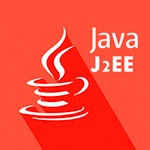Welcome to J2EE
J2EE is a platform-independent, Java-centric environment from Sun for developing, building and deploying Web-based enterprise applications online. The J2EE platform consists of a set of services, APIs, and protocols that provide the functionality for developing multitiered

Why J2EE ?
Dependency Injection
JavaServer Faces
Java Servlet
Interceptors
Course Content - J2EE
Servlet API 3.x
- Introduction to JEE
- Overview of Dynamic web applications
- Introduction to Servlet
- Servlet life cycle
- Annotations and their use in Servlet development
- Difference b/w web server & application server
- Installing and configuring web & application server
- Web Application formats
- Deployment modes supported by servers
- Creating and deploying a simple web application
- Understanding the role of ServletRequest & ServletResponse
- Differene b/w parameters and attributes
- Using different content type for response
- Using RequestDispatcher for Include & Forward
- Initialization Parameters and their use
- ServletConfig & ServletContext
- Inter application collaboration
- State Management and use of HttpSession & Cookies
- Hidden Form fields and URL Rewriting
- Using Http only Cookies
- Listeners and web application events
- Applying Filters to servlets
- Asynchronous request processing
- File Uploading & downloading
- Security
Java Server pages (JSP)
- Advantages of JSP over Servlet
- JSP Architecture
- Integration of JSP & Servlet API.
- JSP implicit objects
- Use of JSP Tags, Actions and Directives
- Error Handling in JSP
- Using Java Beans in JSP
- Defining Custom Tags JSTL & Expression Language
Tools & IDE
- Introduction to Eclipse
- Installing eclipse
- Understanding Perspective & workspaces
- Changing Compiler, JRE and other setting
- Adding and removing plug-in
- Project Management
- Creating various type of projects
- Closing & Importing projects
- Building projects
- Managing Libraries and Dependencies
- Adding jar files from eclipse library
- Adding third party jar
- Removing jar files from a project
- Code Generation & Refactoring
- Generating getter & Setter methods
- Generating constructors
- Overriding and implementing methods
- Renaming classes and members
- Moving classes and packages
- Extracting interfaces and abstract classes
- Server Management
- Configuring web/application server
- Starting and stopping servers
- Deploying and undeploying applications
- Debugging
- Debug perspective
- Using line, method, exception and data member breakpoints.
- Setting up conditional breakpoints.
- Using step into, step over, step return and resume.
- Peeking into stack and heap contents
- Unit Testing
- Introduction to JUnit
- Understanding assertions
- Writing & executing Test Cases
- Managing test cases with Test Suites
- Subversion (SVN) Code Repository & Client
- Need of Code Repository
- Architecture of SVN Code Repository
- Configuring Project in a SVN Code Repository
- Installing SVN Client
- Connecting client to SVN Repository
- Checking out project form the repository
- Updating SVN and local repository
- Log4j
- Understanding the need of Logging
- Introduction to Apache Log4j
- Log4j Architecture: Appender, Logger & Layout
- Log4j Configuration for web application




Infycle Technologies
Let Profession Search You